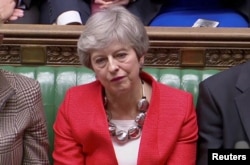British lawmakers voted Thursday to seek a three-month delay in Britain's scheduled March 29 split from the 28-nation European Union after overwhelmingly voting against holding a new Brexit referendum.
The House of Commons voted 412-202 to seek the delay after being unable in several votes this week to muster a majority for an exit plan.
The vote to delay calls on Prime Minister Theresa May to seek an extension from the EU until June 30. The lawmakers have already twice rejected her plans for Brexit, but by law, Britain will leave the EU on March 29 with or without a deal, unless it cancels Brexit or secures the delay.
Earlier, pro-European campaigners wanted a new vote to overturn the 2016 referendum calling for Britain to withdraw from the EU. But lawmakers voted against a new plebiscite, 334-85, with most lawmakers from the main opposition Labor Party abstaining.
String of votes
Lawmakers have held a series of votes on how to proceed with the Brexit deadline two weeks away. On Tuesday, parliamentarians massively voted against May's renegotiated plan with EU leadership that sought to allay concerns about border passage between EU member Ireland and Northern Ireland. On Wednesday, they voted against a plan to quit the EU without any terms of the departure set in place.
The lawmakers on Thursday voted 318-302 against a plan offered by opposition Labor leader Jeremy Corbyn calling for May to use a Brexit delay to give parliament time "to find a majority for a different approach."
EU members would need to approve a delay beyond March 29. They have repeatedly said they would need proper justification to agree to push back the deadline. After Wednesday's vote, they said that while it was one thing for the British government to reject a so-called no-deal exit, at some point it would have to figure out the alternative, a deal that could actually pass.
The EU also prefers that any extension be limited, finishing before its own elections in late May.
European Council President Donald Tusk left open the possibility of a longer delay, saying Thursday that ahead of a meeting of EU leaders next week, he would be appealing to member states to consider that option if Britain "finds it necessary to rethink its Brexit strategy."
Third time?
May brought what she said was an improved deal to Parliament for Tuesday's vote, one that sought to remove concerns about the Irish border with Northern Ireland. Opponents want to make sure Britain is not locked into a long-term customs agreement that subjects the country to EU trade rules.
May hinted Wednesday that she could try for a third time to get lawmakers to approve the deal that negotiators from Britain and the EU worked on for two years.
The Wednesday vote rejecting a no-deal exit does not carry legal weight, only political force, meaning it is still possible that without an extension and without an agreement during the next two weeks, Brexit could proceed with no divorce terms in place.






